As the tide of technology rises, the vessels afloat rise with it. One of these vessels is the internet and through it the entire ecommerce industry thrives around the globe. From every corner of the world the ecommerce industry has established its benchmarks. More and more people of the new era now trust online shops for their needs and luxuries. With easy checkouts, hassle free payment and reliable shipping methods, ecommerce industry is getting the best traffic since its invention.
Why People Prefer to Shop Online?
The primary reason why online shopping has been so penetrating in the recent years is not just because internet has got faster, but there is more to the argument. People are depending on ecommerce stores from things as expensive as super cars such as Lamborghini and Porsche, to things as trivial as their daily groceries. Secondly, with the recent infrastructure and industrial advancements, the city life has become busier and tougher for an average fellow to casually drive by nearest Mall. Then there are risks of getting stuck in traffic jam or losing money to a parking ticket. Sitting on the comfort of your couch is way better than suffering from this ordeal and a rising number of Middle East shoppers are adopting this trend as a lifestyle.
The State of E-commerce in UAE and Middle East
Among the top shopping regions comes the Middle East. It might surprise you but the Middle East ecommerce market reached $18.5 billion in 2019 and its revenue is expected to reach $4 billion by 2020 with 60% of shoppers based in Dubai. With the growing trends many brick and mortar stores have taken their businesses to the online platform for more reach and exposure. To an estimate, nearly 42% of people in the Middle East access their internet with the intention to shop from an online store and 87% of these online shoppers are satisfied with their shopping experience.
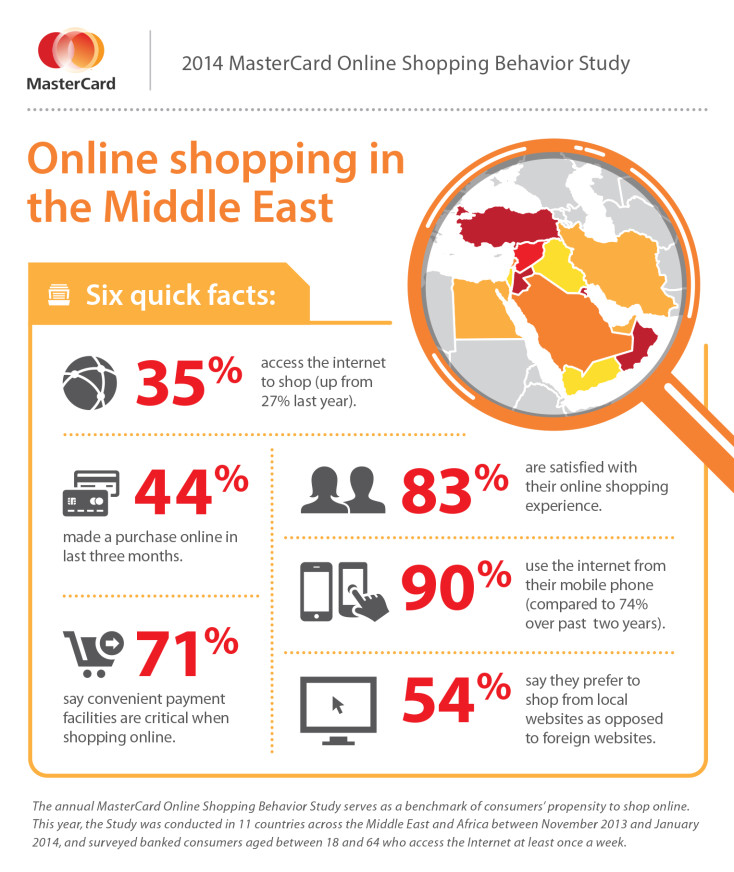
Smartphones and Handheld Devices
With the advent of the latest Smartphones, tablets and other handheld devices, the average online shopper is converting from their traditional desktops to mobile devices where they can shop for products without getting out of bed. According to a study conducted by the Times of Oman, 1 out of 3 people in the Middle East made an online purchase from their cellular devices. The trends also show that 46% of online buyers were convinced to shop through their mobile phones out of the 85% people who access the internet with their cellular devices. Seeing the statistics, many smart business owners in UAE have now converted their websites with responsive designs to allow the users from handheld devices to access their stores without the hassle of unnecessary scrolling or expanding the pages.
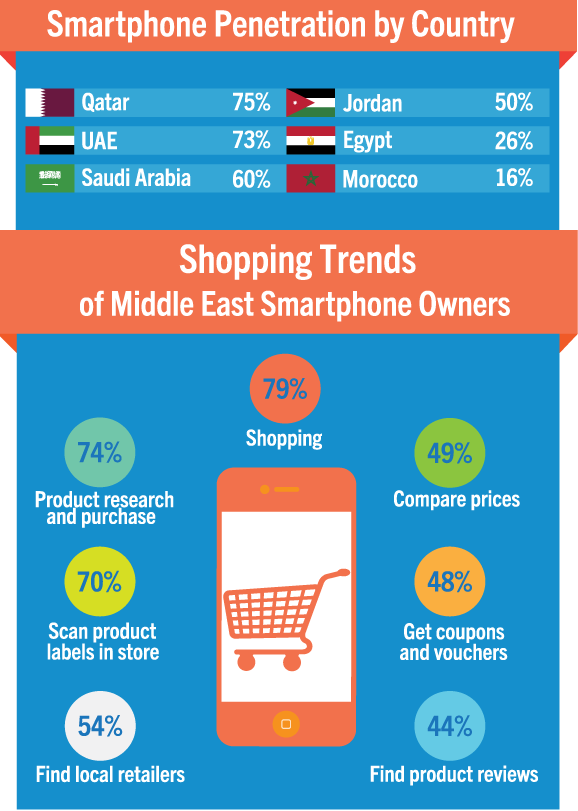
You might also like to read: Top Social Media Influencers from Dubai
Shopper Demographics
One of the most astonishing things about the online buyer demographics in the Middle East is their average age group. According to the latest survey, the highest percentage of buyers are from the younger age groups coming from 26 to 35 years of age. Egypt has the highest with 50%, followed by KSA at 46% and then Kuwait and UAE with virtually the same 42%. Most of the products that are purchased online include air tickets, Electronics, Appliances and fashion wear.
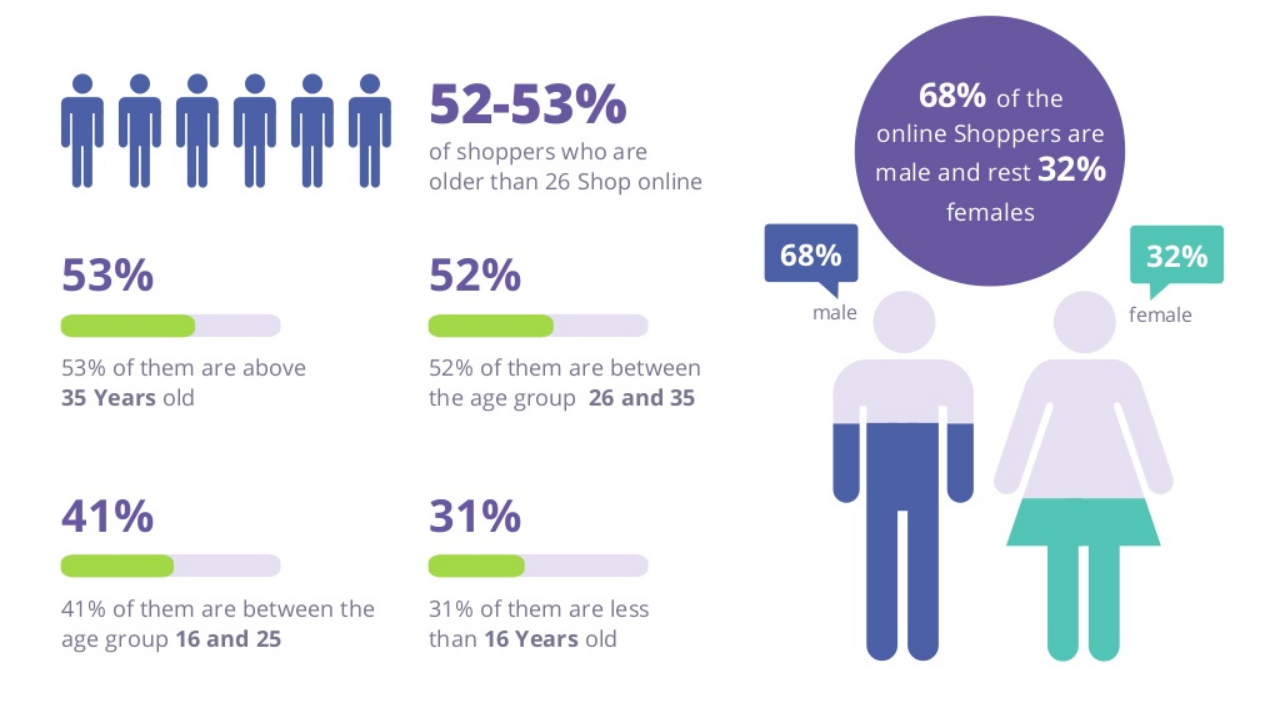
Social Media Influence in Ecommerce
When it comes to online shopping, the influence of social media cannot be sidelined. Social media is one of the biggest platforms that help customers decide what to buy and what not. Social media campaigns are one of the fastest and cheapest ways to spread the exposure of a business and increase its visibility on internet. Greater the followers, greater the feedback businesses get. And as of now, Facebook dominates all.
According to the Global Media Insight's social media statistics in UAE, YouTube is on the lead with 88% active users. Facebook is slightly below at 79% followed by Instagram at 68% and then Twitter at 53%. LinkedIn and Pinterest have 45% and 25% active users respectively. Compared to the 62% global online users that believe in social media influence on buying decisions, Middle East has 72% online buyer that firmly stand that social media platforms are a great source of help and feedback regarding products they are willing to purchase.
Cross Border Shopping Trends
A large percentage of online shoppers in the Middle East are now using cross border products. Recent advancement in gateway security and reliable shipping methods has largely influenced many buyer groups to purchase products from other regions. According to latest statistics 49% of buyers from Middle East prefer buying cross-border products due to free shipping facilities. The beefed up security on payment methods has encourage 49% buyers where as 39% shoppers do cross border purchases due to the unavailability of certain products.
However, there are also certain barriers that prevent customers from cross border shopping. 49% of online shoppers are discouraged to purchase due to high shipping costs and long delivery period. 47% shoppers are concerned about identity theft and fraud and 42% are afraid the delivered item would not be the same as described on the website. This is also the reason why 85% online shoppers prefer cash on delivery compared to the 15 % that are willing to pay via credit or debit cards.
Major Reasons Why UAE is a Powerhouse for E-commerce?
The top reason for the rapid growth of ecommerce in the region is the people’s attitude. The thriving brick and mortar businesses in UAE have not considered online culture as a threat and are not taking it in a confrontational way. The government also fully supports, in fact leads the market and has taken many initiatives such as “Smart Dubai 2021” to leverage emerging technologies and thicken the share that e-commerce business adds to the regional economy.
Logistical infrastructure is the backbone of ecommerce. UAE’s low logistic costs and superb infrastructure is another reason for its thriving ecommerce culture. Deliveries can be made within the shortest time possible, both within the region and globally. The Dubai International Airport is the sixth busiest cargo airport in the world making international deliveries seamless.
The increasing digital penetration and people’s trust in digital payments have also contributed enormously to the growth of ecommerce in UAE. Mobile phone users are at peak and on an average, they are spending seven hours on the internet and social media daily. According to a survye, 66 percent of online users trust online shopping and 70 percent trust online payments in UAE.
Conclusion
It’s great to see that the digital market in the Middle East has grown into industrial mammoth. From basic commodities to purchase of vehicles, infrastructure and property, online shopping is increasing by the day. The Arab world is already expanding its capacity to serve it’s audiences with top league marketing and media campaigns that grips a billion dollar industry. It is expected that in the coming few years the Middle East will set new records in the global ecommerce market. With the current speed and vigor, I have no reason to doubt it.


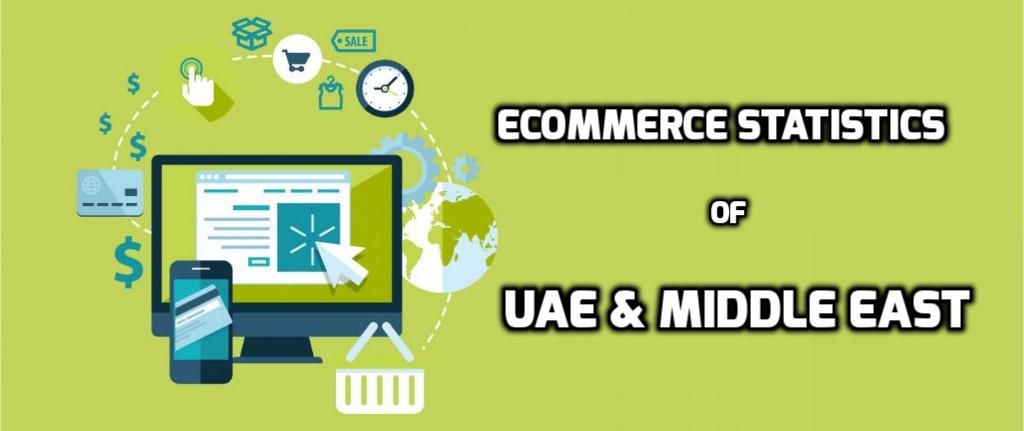
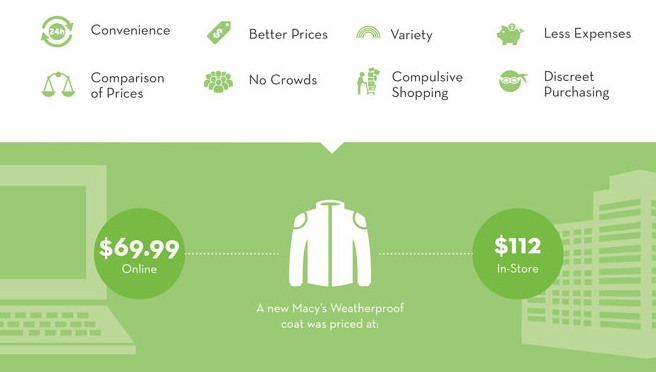 Source
Source